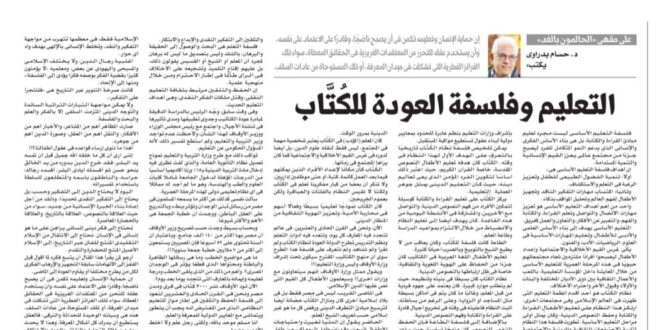Education and the Philosophy of Returning to Kuttab
By Dr. Hossam Badrawi
The philosophy of basic education is not merely about teaching reading and writing; it is about building the intellectual and human foundation that supports the holistic development of individuals, enabling them to become part of a global society that upholds human values and sustainable development.
The Goals of Basic Education Philosophy
- Nurturing children’s natural curiosity and fostering a desire for learning and exploration.
- Developing critical thinking skills, preparing children to understand the world and analyze situations intelligently.
- Enhancing communication skills by teaching reading, writing, comprehension, expressing ideas, cooperation, and teamwork.
- Laying the foundation for scientific and literary knowledge, ensuring children acquire essential skills in science, mathematics, literature, and the arts.
- Instilling ethical and social values by preparing children to be responsible individuals in their communities, emphasizing coexistence within the educational institution through play, cultural activities, interaction with different religions and genders, and fostering respect for differences.
The Historical Role of Kuttab
The Kuttab system is one of the oldest educational systems in the Islamic world and beyond. It was primarily focused on teaching children reading, writing, and memorizing religious texts, serving as an early stage of fundamental education. This system evolved to meet cultural, religious, and social needs but was eventually replaced by structured education systems overseen by ministries of education, with international standards designed to prepare minds for the future.
Historically, the core goal of the Kuttab system was religious education, particularly memorizing sacred texts like the Qur’an, which was seen as the foundation of an individual’s faith and religious awareness. The focus was on learning to read and write to understand religious texts, communicate, and participate in daily life. The system also emphasized discipline and obedience, with strict adherence to study schedules and teacher authority, often enforced through reprimands or physical punishment.
The Transition from Kuttab to Modern Education
Despite its simplicity, the Kuttab system effectively produced literate generations familiar with religious texts. However, the modern world requires more than memorization—it demands critical thinking, creativity, and innovation. The philosophy of education has shifted from rote learning to inquiry-based learning, where students seek truth and evidence through questioning rather than accepting information blindly.
Yet today, there is a proposal to revive the Kuttab system under the supervision of the Ministry of Religious Endowments rather than the Ministry of Education. The proposed curriculum aims to instill Islamic values, raising concerns about the potential for reinforcing outdated methodologies and ideological rigidity. Historically, Kuttab institutions in some Islamic countries have been breeding grounds for religious extremism, instilling a rejection of anything non-Islamic as defined by traditionalist teachers.
The Challenges of Returning to Kuttab
Modern children have greater cognitive capacities than past generations. The contemporary philosophy of education emphasizes critical thinking and reasoning over rote memorization and passive acceptance. True learning involves research, analysis, and structured debate rather than accepting teachings unchallenged simply because a religious figure or teacher asserts them.
Recently, Egypt’s President called for a thorough study of the feasibility of reintroducing the Kuttab system, yet notably absent from discussions was the Minister of Education. Simultaneously, the Ministry of Education introduced changes to the high school system, including assigning a 15% academic weight to religious education in university admissions, a practice unheard of in international education systems.
Another concerning trend is the increasing influence of Friday sermons in shaping public consciousness. With over 140,000 mosques in Egypt and more than 7 million sermons delivered annually, these speeches significantly impact Egyptian society. The key questions are:
- What topics are being preached?
- What underlying messages are conveyed?
- Who delivers these sermons, and how well-versed are they in modern knowledge?
Now, the Ministry of Religious Endowments aims to establish 3,000 new Kuttab institutions across Egypt in parallel with the formal education system, reinforcing rote memorization and religious instruction rather than fostering critical thinking.
A Call for Thoughtful Reform
As a Muslim and a man of science, I believe in the necessity of separating faith from education. Religious movements throughout history—across Islam, Christianity, and Judaism—have often resisted critical thinking, fearing it would challenge established doctrines. The fear of philosophy and questioning has led many religious institutions to stifle intellectual inquiry.
History’s great enlightenment movements called for daring to think. The only way to counter rigid traditionalism and religious extremism is through thought, science, research, and philosophy. Today, appearances matter more than emotions, news overshadows ideas, and tradition outweighs intellect.
Is this the foundation we want to build in the minds of our children?
Everything created by God is beautiful before human interference. Religion, too, was once pure before it was corrupted by human hands—by its so-called guardians, interpreters, and those seeking power through its teachings.
Today, religion does not just require thinking; it requires critical thinking—to reconstruct human experience and redefine our relationships with texts, history, and contemporary civilization. We need a humanistic religious philosophy that values what is truly human in humanity.
We must transition from traditionalist Islam, which has fueled sectarianism for centuries, to authentic Islam—one that fosters civilization and progress.
I urge those who read this article to think critically before resorting to pre-made accusations or intellectual intimidation against those who challenge the past. Protecting and educating individuals means helping them mature, become self-reliant, and use their intellect to break free from inherited beliefs and rigid traditions.
Only through analysis, discussion, dialogue, and intellectual freedom—not rote memorization—can we truly advance.
 Dr. Hossam Badrawi Official Website
Dr. Hossam Badrawi Official Website


